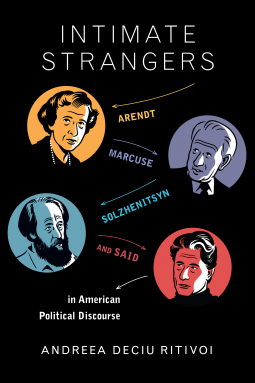
Intimate Strangers
Arendt, Marcuse, Solzhenitsyn, and Said in American Political Discourse
by Andreea Deciu Ritivoi
This title was previously available on NetGalley and is now archived.
Send NetGalley books directly to your Kindle or Kindle app
1
To read on a Kindle or Kindle app, please add kindle@netgalley.com as an approved email address to receive files in your Amazon account. Click here for step-by-step instructions.
2
Also find your Kindle email address within your Amazon account, and enter it here.
Pub Date Sep 09 2014 | Archive Date Nov 17 2014
Description
Hannah Arendt, Herbert Marcuse, Alexander Solzhenitsyn, and Edward Said each steered major intellectual and political schools of thought shaping American political discourse after World War II. Yet none of them was American, and this was crucial to their thinking, which relied on ways of arguing and reasoning that stand both inside and outside of the American context.
In an effort to convince their audiences they were American enough, these thinkers deployed deft rhetorical strategies that made their cosmopolitanism feel acceptable, inspiring radical new approaches to longstanding problems in American politics. Speaking like natives, they also exploited their foreignness to entice listeners to embrace alternative modes of thought. Intimate Strangers unpacks this "stranger ethos," a blend of detachment and involvement that manifested in the persona of a prophet for Solzhenitsyn, an impartial observer for Arendt, a mentor for Marcuse, and a victim for Said. Despite its many successes, though, the stranger ethos did alienate audiences, and many critics continue to dismiss these thinkers not for their positions but because of their foreign point of view. This book concludes with an appeal to reject this kind of xenophobia, throwing support behind a political discourse that accounts for the ideals of both citizens and noncitizens.
Advance Praise
“Ritivoi lends her lucid, careful, well balanced analysis to a topic to which our years of heightened suspicion concede heightened relevance. She offers a wealth of material on the American, German, Russian and Palestinian historical and cultural contexts in a mix organized according to the variety of Arendt, Marcuse, Solzhenitsyn, and Said’s stranger personae. I would have titled this book Hannah and Her Others, had I written it. But I have not.”
—Călin-Andrei Mihăilescu, University of Western Ontario
“Andreea Ritivoi provides a combination of poignant biography with insightful analysis of how the rhetorical strategy of the stranger persona reveals the tightrope that we walk when we converse in the public sphere with those who are part of a social configuration that we enter from the outside. The insight she provides into this insider/outsider relation is bolstered by the rigor and concreteness of her analysis of the public rhetoric of four prominent immigrant intellectuals during their sojourn in the U.S. just before and after the Second World War.”
—Fred Evans, Dept. of Philosophy, Duquesne University
Available Editions
| EDITION | Hardcover |
| ISBN | 9780231168687 |
| PRICE | $35.00 (USD) |
Links
Average rating from 8 members
Featured Reviews
 Leslie G, Book Trade Professional
Leslie G, Book Trade Professional
Readable and smart - i am particularly interested in the rhetorical themes she brings up - every time i had a question about the direction or statements the author was making - they were answered! I felt unease at Solzenytsin and Arendt, not to speak of Marcuse, being compared to each other but it is very persuasive to argue that given their alternate political orientations it gives the full spectrum. i had never thought either Solzehnitsyn and Marcuse are still in academic minds - of course Arendt is and not because of the recent film (tedious and biased), and Said who had major influence internationally on academics - and that irked me too - lumping them together - but the text is also considering foreign influence in a historical context - and arguments resonate with Derrida and Levinas' ideas (not to speak of Mauss) on the neighbour, the stranger, the foreigner - really meaty and well written (readable and accessible were going to be my 'shout lines') - the erudition and empirical material are handled in engaging way. top marks!
Readers who liked this book also liked:
Cecilia Eudave
General Fiction (Adult), Literary Fiction, Multicultural Interest
John Kotter; Holger Rathgeber
Business, Leadership, Finance, Nonfiction (Adult)













